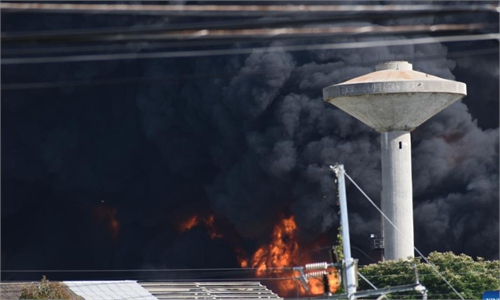Cuba continues to promote cigar exports for economic recovery as the country braves the headwinds from the COVID-19 pandemic and the US trade embargo.
Situated on the outskirts of the Cuban capital city of Havana, the El Laguito cigar factory is well known for producing Cohiba cigars over the past five decades.
The factory, one of the five making cigars for exports in Havana, has some 250 workers, with 70 percent being women.
Among them is Nelsa Leonard, a 75-year-old roller, who started working at El Laguito in 1968.
She expects Cuban cigar production to help the Caribbean nation's economy recover amid the COVID-19 pandemic.
"These are the best cigars in the world and Cohiba is our top brand," she said. "We are doing our best to sell as many Cuban cigars as possible to the world."
Official data showed that in 2021, the Caribbean nation reported record sales of its hand-rolled cigars worth more than $507 million, as the tobacco industry is one of the four core sectors that contribute most to Cuba's GDP.
Oscar Rodriguez, director of El Laguito cigar factory, said that they are now making some 9,000 Cuban cigars a day.
"We continued to work despite the COVID-19 pandemic as this is a critical sector for the performance of the economy," he said. "This factory is projected to deliver 2 million Cuban cigars by the end of the year."
Moreover, "incomes from Cuban cigar sales are redistributed to improve living conditions of people," female roller Marilyn Sanchez said. "With that money, the government repairs hospitals and schools."
The upcoming Cuban tobacco harvest is scheduled to start in October 2022, said the Cuban Ministry of Agriculture.
It came amid the COVID-19 pandemic and the intensification of the US trade embargo on the Caribbean nation.
Cuban Minister of Foreign Affairs Bruno Rodriguez said that in the first 14 months of US President Joe Biden's administration, the embargo has caused Cuba economic losses of around $6.3 billion.
First imposed in 1962, the embargo was tightened by Biden's predecessor Donald Trump, who imposed more than 240 sanctions against the island.
The US "persists in ignoring the demands of the international community and has intensified the blockade to unprecedented levels," he said.
The island's economy started to see a slight recovery during the first half of 2022. However, "the US blockade, which remains almost invariable, continues to be the main obstacle to the development of Cuba," said Cuban economist Jose Luis Rodriguez.
Situated on the outskirts of the Cuban capital city of Havana, the El Laguito cigar factory is well known for producing Cohiba cigars over the past five decades.
The factory, one of the five making cigars for exports in Havana, has some 250 workers, with 70 percent being women.
Among them is Nelsa Leonard, a 75-year-old roller, who started working at El Laguito in 1968.
She expects Cuban cigar production to help the Caribbean nation's economy recover amid the COVID-19 pandemic.
"These are the best cigars in the world and Cohiba is our top brand," she said. "We are doing our best to sell as many Cuban cigars as possible to the world."
Official data showed that in 2021, the Caribbean nation reported record sales of its hand-rolled cigars worth more than $507 million, as the tobacco industry is one of the four core sectors that contribute most to Cuba's GDP.
Oscar Rodriguez, director of El Laguito cigar factory, said that they are now making some 9,000 Cuban cigars a day.
"We continued to work despite the COVID-19 pandemic as this is a critical sector for the performance of the economy," he said. "This factory is projected to deliver 2 million Cuban cigars by the end of the year."
Moreover, "incomes from Cuban cigar sales are redistributed to improve living conditions of people," female roller Marilyn Sanchez said. "With that money, the government repairs hospitals and schools."
The upcoming Cuban tobacco harvest is scheduled to start in October 2022, said the Cuban Ministry of Agriculture.
It came amid the COVID-19 pandemic and the intensification of the US trade embargo on the Caribbean nation.
Cuban Minister of Foreign Affairs Bruno Rodriguez said that in the first 14 months of US President Joe Biden's administration, the embargo has caused Cuba economic losses of around $6.3 billion.
First imposed in 1962, the embargo was tightened by Biden's predecessor Donald Trump, who imposed more than 240 sanctions against the island.
The US "persists in ignoring the demands of the international community and has intensified the blockade to unprecedented levels," he said.
The island's economy started to see a slight recovery during the first half of 2022. However, "the US blockade, which remains almost invariable, continues to be the main obstacle to the development of Cuba," said Cuban economist Jose Luis Rodriguez.



